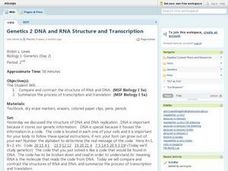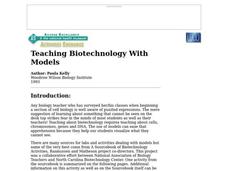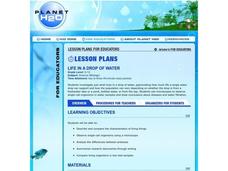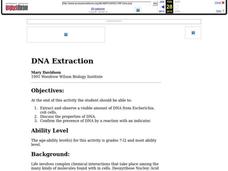Curated OER
Use of Microscopes and Creation of Slides
Students explore the use of microscopes and the creation of slides. They practice using, adjusting and viewing with a microscope. they view slides of familiar substances such as blood and fibers. In addition, they create slides using...
Curated OER
Structure of Natural Narratives
Class pairs select a prompt from a provided list and tell (and record) their story to their partner. They then examine linguist William Labov's model for natural narratives, and apply his model to their tale. Next, class members watch...
Curated OER
Photocells II: The Photoelectric Effect in Photocells
Learners discuss the principles of atomic structure that underlie the operation of a photovoltaic cell and explains how they apply to a photovoltaic cell's operation. An area of the classroom is staked off to represent a photovoltaic...
Curated OER
Chloroplasts
Students study chloroplasts, their structure and evolution. In this photosynthesis lesson plan students experiment with polarized light and the production of chlorophyll.
Curated OER
Blood and the Circulatory System
In this circulatory system worksheet, high schoolers review the organs that are involved with this body system, including their structure and function. Students explore the problems that can occur with the circulatory system. This...
Virginia Department of Education
Prokaryotes
Lead your biology class on a cell-sized adventure! Emerging scientists construct models of prokaryotes, then design an experiment to properly grow a bacterial culture. They conclude the activity by viewing the culture under a microscope....
Nuffield Foundation
A Closer Look at Blood
Here is a lab that has teenage scientists examining samples of their own blood under a microscope. Learners carefully prepare slides, then make detailed observations and identifying different types of cells using a key.
Curated OER
DNA AND PROTEIN SYNTHESIS IN THE CELL
Students explore the structure of DNA and the process of DNA replication, describe the process of protein synthesis, recognize the importance of proteins in the human body, and look at how mutations affect protein synthesis.
Curated OER
DNA and RNA Structure and Transcription
Students compare and contrast the structure of RNA and DNA.They summarize the process of transcription and translation. The lesson uses an inquiry model and the use of codes in DNA.
Curated OER
A Lab Demonstration: Three dimensional view of soft internal structures of bony material
Students discuss the structures of a bone and observe a demonstration of bony materials.
Curated OER
How do things flow in and out of a cell?
High schoolers revise thier partner's essay. They also write the second draft of their essay for homework. Students use the Protein Explorer web site to visualize molecules, ATP, DNA, proteins and lipid bilayer. They are able to see...
Curated OER
Teaching Biotechnology With Models
Students are introduced to biotechnology by using models. The teacher uses A Sourcebook of Biotechnology Activities, Rasmussen and Matheson project co directors. One of the activities in the book is: students use a scale models to very...
Curated OER
Life in a Drop of Water
Young scholars examine the structure, function, and characteristics of microscopic organisms that inhabit freshwater through collection of water samples and observation through microscopes.
Curated OER
Living Environment
For this environment worksheet young scholars complete a series of multiple choice and short answer questions on genetics, populations and cell structure.
Curated OER
DNA Isolation from Onion
Students apply measurement skills using the metric system. They explain the process of isolating DNA from other cell contents. They apply knowledge of cell structure to explain the process of isolating DNA.
LABScI
Botany: The Plant Dissection Lab
Study everything about plants! The 12-part series of lessons continues with an examination of many aspects of plants. Components of the laboratory activity address the growth and structure of plants by evaluating familiar plants. The...
Virginia Department of Education
Building a DNA Model
It has been decades since the discovery of DNA. Still, activities such building this DNA model allow blossoming scientists to better understand the components that form this overall structure. During this activity, they will also...
University of Minnesota
Dendritic Spines Lab
This is your brain on drugs ... literally! Your neuroscientists-in-training examine the evidence of drug use on the human brain and how neurons change their connectivity when altered by drugs. They then work together to create testing...
The New York Times
Sequencing the Stages: Understanding H.I.V. Infection at the Molecular Level
How does HIV operate at the molecular level? Pupils discover the progression from a healthy immune cell to one infected with HIV, watch an animation of the HIV life cycle, and finally identify each of the stages with illustrations...
University of Minnesota
Close-up of the Nervous System
Make sure your class gets on your nerves! Learners of all ages practice peering into the nervous system to see what's inside. Groups examine prepared slides of mammalian nervous system tissues, all while gaining microscope skills. The...
Nuffield Foundation
Dissecting Lungs
Here is a lab activity where teens experience the respiratory system first-hand as they dissect lungs and identify key structures within the system. Although the website is written in British English with some slightly different verbiage...
Curated OER
DNA Extraction
Students are able to extract and observe a visible amount of DNA from Escherichia coli cells. They discuss the properties of DNA. Students confirm the presence of DNA by a reaction with an indicator.
Virginia Department of Education
DNA Extraction from Strawberries
Has your class ever been astounded by the complexity of DNA analysis? Have they ever asked why genetic engineering has become so important to our daily lives? Young scientists perform DNA extraction on strawberries and explore how the...
Curated OER
Neurons and the Nervous System
The highlight of this series is activitiy #4. Anatomy pupils examine slides of three unknown cells. With the function of the nervous system in mind, they consider the structure of each and try to guess which one is part of that system....
Other popular searches
- Cell and Molecular Biology
- Biology Unit Cell
- Biology and Cell Organelles
- Biology Cell Structures
- Biology Cell Respiration
- Biology Cell Function
- Biology Cell Energy
- Biology Cell Membranes
- Biology Cell Types
- Biology Cell
- Biology Cell Nucleus
- Biology Eukaryotic Cell























